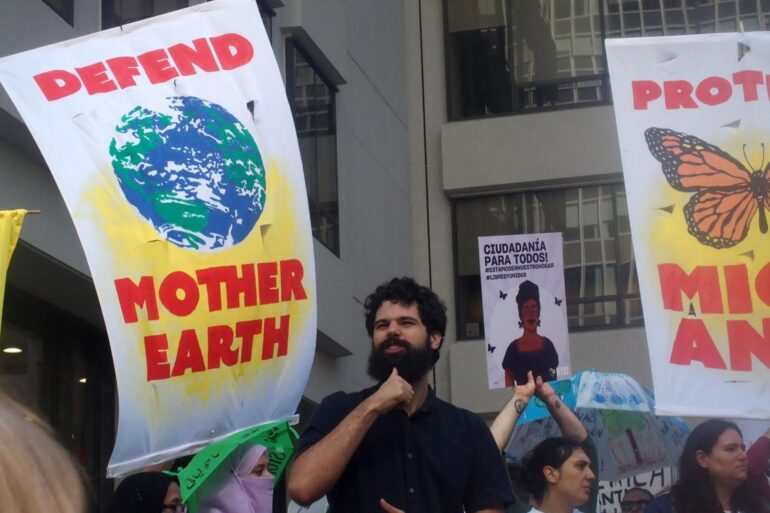🔴 Website 👉 https://u-s-news.com/
Telegram 👉 https://t.me/usnewscom_channel
As world leaders and influencers converge for New York’s UN General Assembly and Climate Week, two incompatible visions are about to clash — rich-world elites obsessed with climate change versus developing nations battling poverty, hunger and disease.
Here’s a plain fact the elites refuse to accept: Hundreds of trillions of dollars spent on traditional climate policy can only deliver tiny benefits, but devoting just billions to simple, proven policies can transform lives, alleviate poverty, promote health and boost resilience.
This chasm highlights why most of the world perceives rich virtue-signaling elites as disconnected from reality.
The climate activists flooding New York this week ignore decades of failed summits.
Since 1992’s Rio Earth Summit, the renewable share of global energy has risen just two percentage points, from 12% to 14%, despite the world spending over $14 trillion — mostly on ineffectual subsidies.
On current trends, it will take another four centuries to get to all-renewable energy production.
And even if all unconditional pledges are fully implemented, emissions in 2030 will still be about 19% higher than 2019 levels, the UN predicts.
Yet expect the activists to make bolder, costlier promises, blind to their economic toll and puny impact.
Last year, the world spent over $2 trillion on climate policies. By 2050, net-zero will cost an impossible $27 trillion every year.
This will choke growth, spike energy costs and hit the poor hardest — and still will deliver only 17 cents back on every dollar spent.
Meanwhile, mere billions of dollars could save millions of lives.
No glitzy “Maternal and Newborn Care Week” in New York draws celebrity advocacy power, yet 260,000 mothers and 2.3 million newborns die annually.
Simple interventions — like a $5-per-use hand-pumped neonatal resuscitator for birth asphyxia—could avert 166,000 maternal and 1.2 million infant deaths for $2.1 billion.
Every dollar invested in such a program would generate social returns worth $87, an investment 600 times more effective than net-zero policies.
And there’s more: For $1.7 billion we could extend childhood vaccines to save 500,000 kids annually, yielding $100 in social returns per dollar spent.
Another $1.1 billion would fight malaria, avoiding 200,000 deaths and giving $48 back to society on every dollar.
And $5.5 billion in agricultural research and development would hike food yields by 10%, cutting hunger for 100 million people.
Contrast this with climate policies’ huge costs and paltry returns.
If, as is realistic, only rich countries end up carrying through these promises, the cost could reach $5,000 to $20,000 per person per year — unaffordable and implausible.
Yet the impact is trivial: Even the UN’s own climate model finds a negligible difference between the current policies of the rich world and achieving net-zero by 2050.
That’s because either way, most emissions will be coming from China, India and Africa, which are understandably prioritizing poverty alleviation via cheap energy.
Climate campaigners claim that the end of the world is close. But in reality, meta-studies by climate economists analyzing the impacts of climate change find that unchecked warming would cut global GDP by 2% to 3% by mid-century — very far from Armageddon.
We won’t find the solution to climate change in making energy ever more unaffordable and unreliable, but in energy innovation.
The world needs to boost green R&D spending to accelerate breakthroughs that will make green energy cheaper than fossil fuels — making the shift possible for all, not just for wealthy elites.
And lifting people out of poverty makes them less vulnerable and more resilient in the face of climate challenges.
The global choice is a stark one: Whether to focus first on tackling the world’s most urgent problems of disease, hunger and poverty, or on the climate concerns of the world’s rich.
Climate Week in New York will inevitably echo the same failed script.
Meanwhile, just a tiny fraction of the ill-spent climate trillions could be spent smartly to tackle humanity’s deadliest foes.
Developing nations aren’t able to wait around to watch the rich-world theatrics. They need energy, food and health assistance now.
After 30 years of a narrow climate agenda drowning out all the world’s other challenges, it’s time to pivot.
The world’s poor need better livelihoods — not pointless multi-trillion-dollar gestures.
Bjorn Lomborg is president of the Copenhagen Consensus, a visiting fellow at Stanford University’s Hoover Institution and author of the books “False Alarm” and “Best Things First.”

